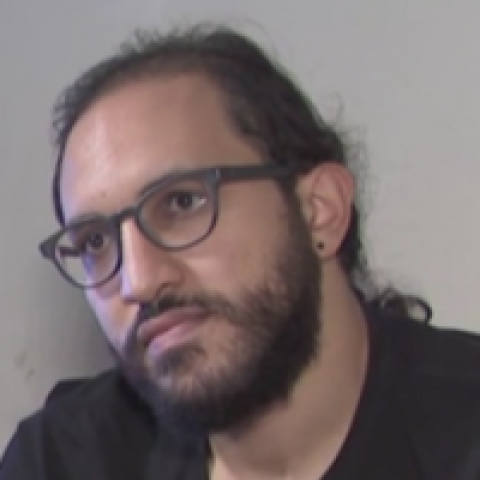State surveillance and protest: “They try to make people think twice before taking to the streets”
State surveillance of digital communication in Egypt – and around the world – profoundly affects people's ability to organise demonstrations and assemblies by creating a culture of fear.
Ramy Raoof is a digital security expert bent on helping activists, journalists and others to protect their privacy, and he has won international awards for his efforts. He serves as senior research technologist at the Egyptian Initiative for Personal Rights (EIPR), a member of the International Network of Civil Liberties Organizations (INCLO), which prioritises work on informational rights as well as police brutality and social protest.
Ramy has extensive experience in the Middle East and North Africa, and in recent months he has been sharing his knowledge with organisations in Latin America. He has seen firsthand how Egyptian officials use the information they collect through surveillance to harass and smear people working at NGOs. This crackdown on activists, which has intensified since 2013, seeks to silence dissent and diverse viewpoints. But Ramy says Egypt is far from alone in its murky use of state surveillance: the problem is global.
CELS: How does the use of surveillance technologies serve to chill the right to protest?
Ramy Raoof (RR): The way (states) are using surveillance is to limit people’s ability to organise. And people organise through different means: it could be through mobile apps or websites, with different tools ranging from Facebook and WhatsApp to Signal and Telegram and other ways. And then the adversary deploys surveillance to monitor people – not to ban them, but to know what they are going to do and then disrupt this action in some way.
Digital security expert Ramy Raoof. Image: CELS. Some rights reserved.
They think through surveillance they will disrupt people’s ability to organise and speak freely. So when there is a group of people trying to organise a protest or a demonstration or a sit-in or a march, or any form of assembly in a public space, the main way to make it ineffective is by monitoring people’s lives and then making an example of one of them.
How do they do this?
RR: When they make arrests, they will say: we have seen them planning this over email, or we have seen some Facebook activity about this. They create this sense of fear that your emails and communications and everything are under surveillance, even if it’s not true, but they just keep saying it so people will believe it.
When the adversary starts to attack the leaders of the community, or certain specific prominent figures, it’s basically to send a negative message to the others: we know what you are doing, we can see what you are doing, and we will punish you.
The whole idea is that they are trying to make people think twice before taking to the streets. And that’s why in some countries they not only deploy surveillance, they also make public assemblies illegal. So doing a protest, a march, a demonstration, a call for protest in itself is an illegal act and it’s complemented by surveillance.
In Egypt, how does the government justify its surveillance?
RR: One of the few times they had to speak publicly, when we were doing campaigns and research and publications against this, they went from not commenting, to denying, to admitting it’s happening, and then using the same international arguments used by different countries to justify this, most famously fighting terrorism: “It’s only used against the bad guys, you have nothing to hide.”
They have also said “we are following the lead of the UK and US, we want to be like democratic countries so we are doing this.” And at that time David Cameron was calling to block social media, so the guys in Egypt were super happy because (they thought) “OK, it’s coming from the UK, we’re also going to do the same, we will follow his steps.”
We cannot have an informed discussion and share knowledge and critique ourselves if we feel we are always being watched
Who is actually being monitored by states?
RR: When we look at the people who are under surveillance, they are not the most criminal or dangerous people. They are just normal people: they could be activists, artists, lawyers, university teachers, people who teach kids, they could be restaurants, coffee shops, it could be anyone.
So the assumption that (states) would only monitor specific profiles or specific kinds of people – that was true many, many years ago, but now we are seeing the scope of the mass surveillance going on, and they are just after everyone’s personal life.
We cannot have an informed discussion and share knowledge and critique ourselves if we feel we are always being watched. This means we don’t really have privacy to freely think and speak and discuss different topics without any interference or predetermined answers.
What can activists do to protect themselves?
RR: Since they are using surveillance to disrupt people’s ability to organise, people can fight back by adopting and advocating for free and open encryption because it will disrupt their surveillance ecosystem.
Across all countries and all intelligence agencies, they really hate encryption because it doesn’t allow them to see what they would like to see, and they would like to see everything, anytime, without restrictions, without permissions, without due process, without justification, without oversight. And encryption disrupts that.
That’s why encryption is very crucial to a healthier society in an open and free manner, because it’s our enabling mechanism towards private communication.
This interview has been published via Open Democracy (oD) website in 4th October 2017





